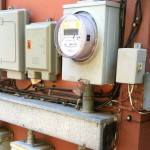New Rules for Power Line Safety Before PUC

Photo Courtesy of Slowek Puklo via Flikr http://www.flickr.com/photos/spuklo/
Storms often cause trees to fall on power lines, sometimes bringing blackouts to thousands.
Correction: The original version of this story said the PUC Meeting was Wednesday. It is Thursday Dec. 13.
It’s natural to feel powerless when you’re stuck at home during a torrential Texas thunderstorm. It’s even worse if you’re literally without power. All it takes is one tree branch falling onto an electrical wire to cut your precious access to the grid.
But there’s little regulation in Texas aimed at keeping branches out of the way of power lines. Nationally, there are rule to protect transmission lines, but none aimed at the smaller wires that line our neighborhood streets and bring light into our homes. There are industry building standards, but each state legislature has to decide whether or not to regulate and enforce on their own.
“It depends on the state, in some states, the legislature has given them enforcement authority and in some they do not,” says Rob Thormeyer of the National Association of Regulatory Utility Commissioners.
In Texas, the Public Utility Commission (PUC) has traditionally practiced a hands-off approach when it comes to such regulation. But that might change with a vote before the commission this week.
PUC Spokeperson Terry Hadley says if a proposal up for vote Thursday is approved, companies that own transmission and distribution lines will need to devise a plan for dealing with vegetation around power lines, and file reports with the PUC about those plans. This would only apply to the deregulated parts of the electric market, so places like Austin and San Antonio would be exempt.
“The rules would require two basic areas of reporting. What has happened, what has been accomplished in terms of vegetation management. And also what plans are in place for these utilities moving ahead to management vegetation in their networks,” Hadley said.
That’s important because overgrown trees are a major cause of blackouts. But requiring private utilities to report their plans for managing trees might help another problem as well: wildfires started by power lines.
Many of the major wildfires last year in Central Texas were ignited by power lines. So it might stand to reason that requiring utility companies to have a plan to manage vegetation around the lines would keep more fires at bay.
Though Professor Don Russell is skeptical.
“My professional opinion is that most of what the PUC is doing will not have any material effect on the issue of wildfire causation by power lines,” Russell, Director of the Power System Automation Laboratory at Texas A&M University, told StateImpact Texas.
According to Russell, problems with wildfires and power lines involve many more variables of line grid maintenance, weather, and line upkeep than what the Public Utility Commission has addressed in its rules.
He says the proposed rules are a step in the right direction towards fewer blackouts. Though we could be doing more to prevent those as well.
The thing is, it would require cutting down more trees. Something many people would find hard to swallow.
“’Cut everybody else’s trees, just leave mine alone, right?’ That’s what most people think,” he said. “The truth is that this is a serious discussion. I would be willing to sacrifice some trees in order to keep the power system more reliable.”

